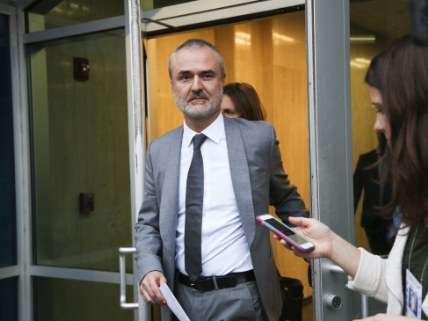Univision Bites Head Off Gawker but Keeps Its Appendages
Principal site to be shuttered. Ancillary pages to continue.


Gawker.com is dead! Long live … everything else at Gawker?
Univision has announced—after purchasing the Gawker media empire in an auction for $135 million—it will be shutting down the site for which the outlet got its name. However, according to reports, its other sites, like Jezebel and Deadspin, will remain in operation.
This is all the consequence of the successful lawsuit by Terry "Hulk Hogan" Bollea against the site for publishing a private sex tape. It turned out that the lawsuit was bankrolled by billionaire Peter Thiel, who was furious at Gawker for outing him as gay and other behavior he thought was "bullying."
The fight brought to the forefront the tension between the free press and the right to privacy. This conflict is most certainly not a new fight and it's not the first time a media outlet has been determined (by a jury in Florida in this case) to have gone too far. But the top concern that has come out of this case is a fear that the wealthiest among us can seek revenge against media outlets that say things they don't like by bankrolling others in an effort to destroy them that is very difficult to fight against.
Note that Gawker isn't accused here of printing factually inaccurate information about Thiel. It's information that Thiel didn't want Gawker to publish about him and that he didn't believe was in the "public interest." As Jacob Sullum noted on Tuesday, that's not a calculation upon which we're all in agreement:
Giving juries the power to determine what counts as a "public interest" or a "good reason," not to mention whether a story advances it, poses a threat even to journalism that Peter Thiel would recognize as legitimate, because people commonly disagree about such matters. Even when a news outlet crosses the line of decency by publishing true but sensitive information that causes an innocent person anguish without any benefit aside from entertainment or titillation (as Gawker arguably did in Thiel's case), it does not follow that anyone's rights were violated, which should be a prerequisite for legal action.
While the media is focused on the impact on the media and about rich elites attacking the media, Ken White, over at Popehat, wants to remind us all that this also happened because we have a court system that is very receptive to this kind of behavior:
[F]or most of us the scary part of the story is that our legal system is generally receptive to people abusing it to suppress speech. Money helps do that, but it's not necessary to do it. A hand-to-mouth lunatic with a dishonest contingency lawyer can ruin you and suppress your speech nearly as easily as a billionaire. Will you prevail against a malicious and frivolous defamation suit? Perhaps sooner if you're lucky enough to be in a state with a good anti-SLAPP statute. Or perhaps years later. Will you be one of the lucky handful who get pro bono help? Or will you be like almost everyone else, who has to spend tens or hundreds of thousands of dollars to protect your right to speak, or else abandon your right to speak because you can't afford to defend it?
The system isn't just broken for affluent publications targeted by billionaires. It's broken for everyone, and almost everyone else's speech is at much greater risk. Don't point to Peter Thiel as an exception. He's just a vivid and outlying expression of the rule.
Indeed, attacks like this on media outlets actually happen all the time but are much lower profile. It's very easy to harass a newspaper or television station and force them to spend money over the dumbest of things. When I was the editor of a small community newspaper (daily circulation: 5,000), we spent more than a year defending ourselves against a baseless, silly lawsuit for publishing the contents of a publicly released police report. In another case we were threatened with a lawsuit from a guy who was literally on death row for murder. I had to deal with frequent angry calls from citizens who were upset when their arrests showed up in our police reports (and as it was, we only reported names for those arrested for felonies).
We had insurance to cover the costs of these lawsuits, but we had to pay and then get reimbursed. I had to alter our budget to account for the fight. The bigger fear is not people who think they're Peter Thiel, but rather the people who think they're Hulk Hogan and decide that the things that they've done are not in the "public interest," even when they clearly are.


Show Comments (63)